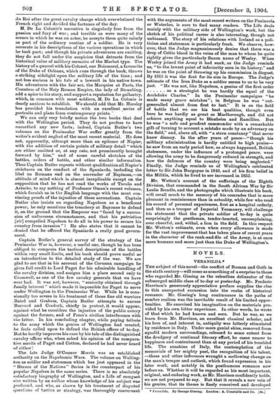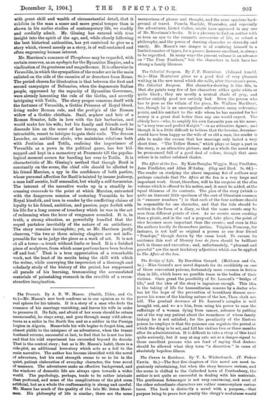THE subject of this novel—the conflict of Roman and Goth
in the sixth century—will come as something of a surprise to those who regarded Mr. Gissing as the relentless delineator of the submerged middle class of to-day or yesterday. Mr. Frederic Harrison's generously appreciative preface supplies the clue to this unexpected excursion into the realm of historical romance. Mr. Gissing's long continuance in the paths of sombre realism was the inevitable result of his limited oppor- tunities. He exercised his imagination on the materials pro- vided by his own bitter experience. In other words, he wrote of that which he had known and seen. But he was, so we learn from Mr. Harrison, an excellent classical scholar, and his love of, and interest in, antiquity was latterly stimulated by residence in Italy. -Under more genial skies, removed from squalid modern surroundings, released to some extent from the drudgery of continual literary effort, he came nearer to happiness and contentment than at any period of his troubled life. The sunshine of Italy, the contemplation of the memorials of her mighty past, the recognition of his talent, —these and other influences wrought a mellowing change on the man's temper and outlook, which found expression in his later work, and notably in the posthumous romance now before us. Whether it will be regarded as his most important, original, and enduring work, as Mr. Harrison confidently holds, we are not prepared to say. But that it reveals a new vein of his genius, that its theme is finely conceived and developed
• irranilda. By George Gissing. London : A. Constable and Co. i_68.]
with great skill and wealth of circumstantial detail, that it exhibits in the man a saner and more genial temper than is shown in his earlier studies of contemporary life, we readily and cordially admit. Mr. Gissing has entered with true insight into the spirit of the age, and, while closely following the best historical authorities, has yet contrived to give us a story which, viewed merely as a story, is of well-sustained and often engrossing human interest.
Mr. Harrison's romance of Theophano may be regarded, With certain reserves, as an apologia for the Byzantine Empire, and a vindication of its greatness and magnificence. It is otherwise in Veranilda,in which the sympathies of the reader are in the main enlisted on the side of the enemies of or deserters from Rome. The period chosen for illustration is that between the first and second campaigns of Belisarius, when the degenerate Italian people, oppressed by the rapacity of Byzantine Governors, were already lamenting the rule of the Goths, and secretly intriguing with Totila. The story proper concerns itself with the fortunes of Veranilda, a Gothic Princess of Royal blood, living under Roman rule, and the protegee of the Roman widow of a Gothic chieftain. Basil, nephew and heir of a Roman Senator, falls in love with the fair barbarian, and would make her his wife; but his family and friends seek to dissuade him on the score of her heresy, and finding him intractable, resort to intrigue to gain their ends. The deacon Leander, an ambitions cleric, who maintains relations both with Justinian and Totila, realising the importance of Veranilda as a pawn in the political game, has her kid- napped and kept in a monastery at Praeneste till the psyCha- logical moment occurs for handing her over to Totila. It is characteristic of Mr. Gissing's method that though Basil is constantly on the scene, the chief role should be allotted to his friend Marcian, a spy in the confidence of both parties, whose personal affection for Basil is tainted by insane jealousy, a man half ascetic, half sensualist, but wholly a self-tormentor. The interest of the narrative works up in a steadily in- creasing crescendo to the point at which Marcian, entrusted with the dangerous mission of restoring Veranilda to her Royal kinsfolk; and torn in sunder by the conflicting claims of loyalty to his friend, ambition, and passion, pays forfeit with his life for a long course of treachery which he was in the act of redeeming when the hour of vengeance sounded. It is, in truth, a strong situation, so powerfully handled that the sequel partakes inevitably of the nature of an anticlimax. The story remains incomplete; yet, as Mr: Harrison justly observes, "the two or three missing chapters are not indis- pensable for us to judge the piece as a work of art. It is not at all a torso—a trunk without limbs or head. It is a finished piece of sculpture, from which some portions have been broken off and lost." That is a true appreciation of a remarkable work, not the least of its merits being the skill with which the writer, while conveying the impression of a thorough and scholarly study of the history of the period, has suppressed all parade of his learning, transmuting the accumulated materials of painstaking research in the crucible of a recon- structive imagination.







































































 Previous page
Previous page